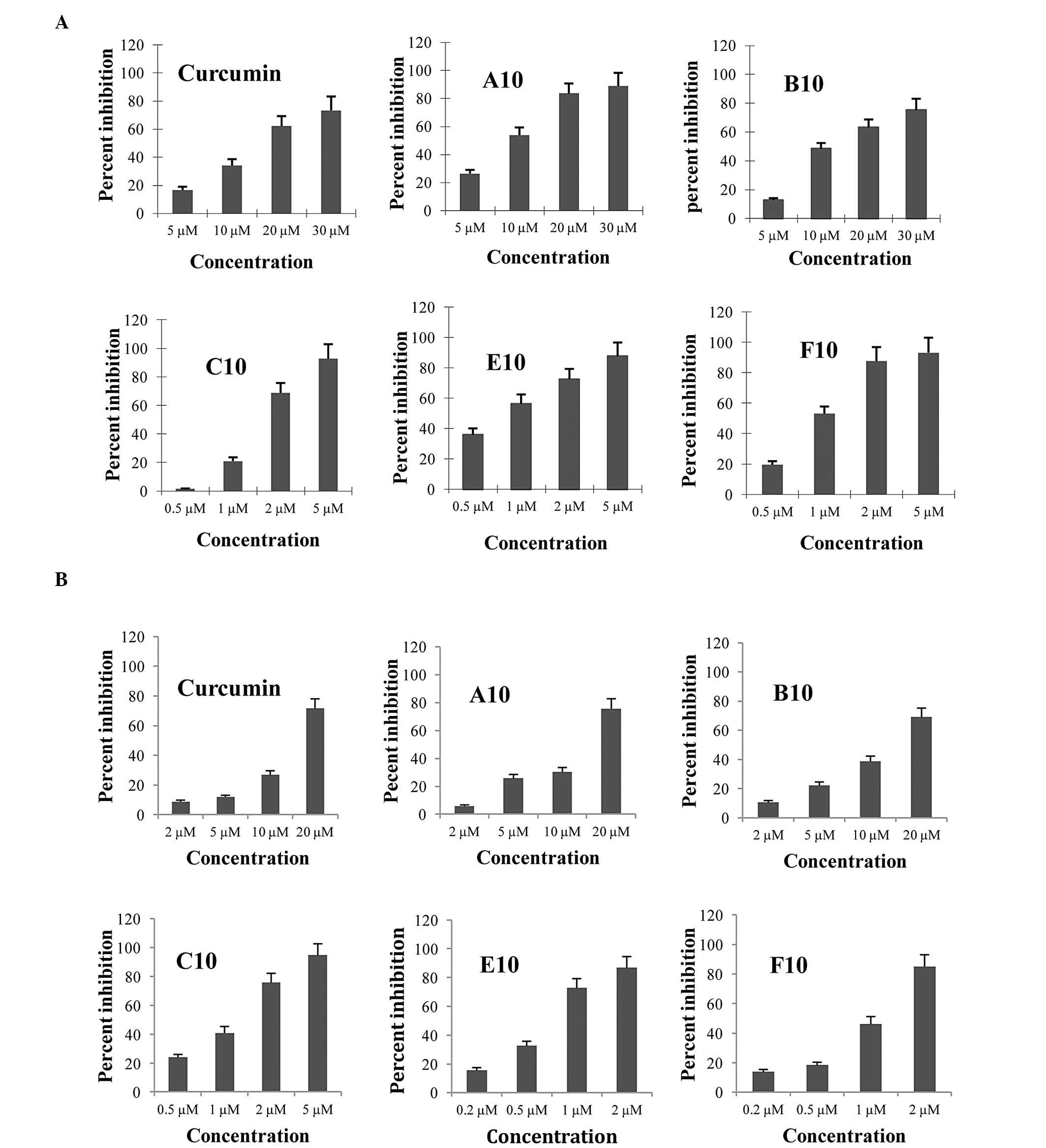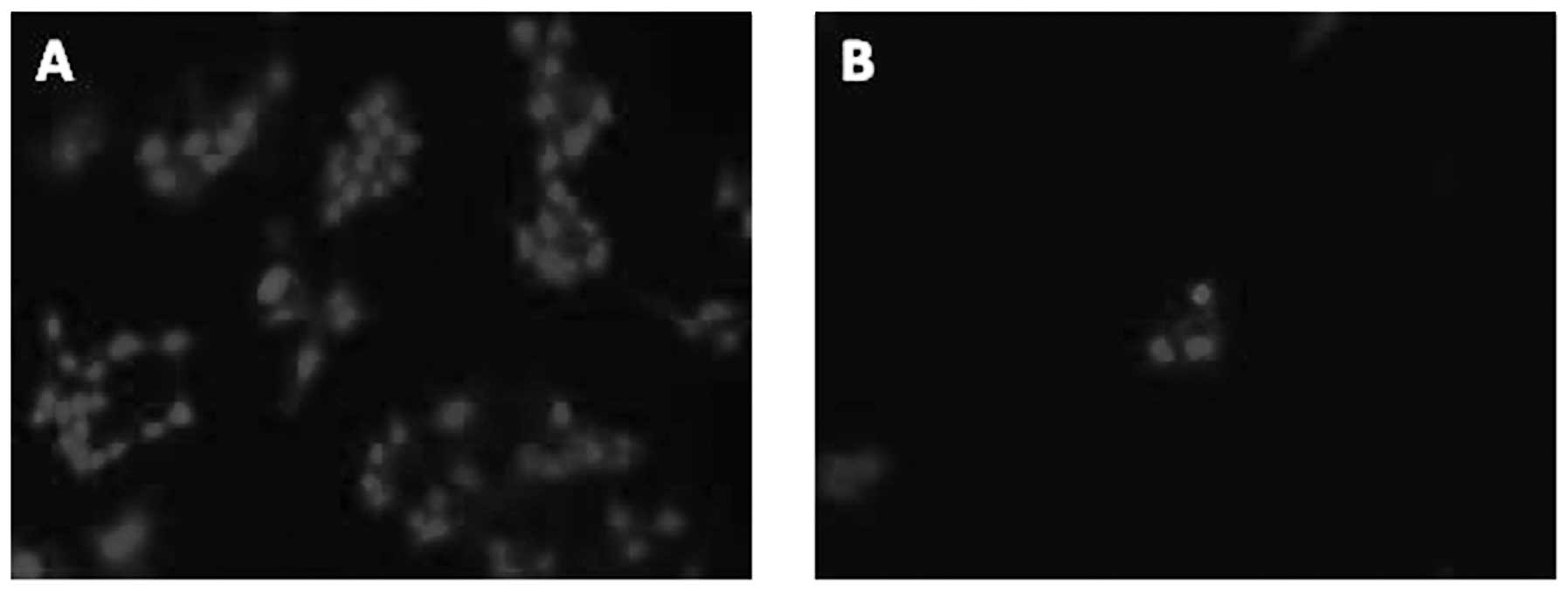|
1
|
Siegel R, Ward E, Brawley O and Jemal A:
Cancer statistics, 2011: the impact of eliminating socioeconomic
and racial disparities on premature cancer deaths. CA Cancer J
Clin. 61:212–236. 2011. View Article : Google Scholar : PubMed/NCBI
|
|
2
|
Gao W, Bohl CE and Dalton JT: Chemistry
and structural biology of androgen receptor. Chem Rev.
105:3352–3370. 2005. View Article : Google Scholar : PubMed/NCBI
|
|
3
|
Heinlein CA and Chang C: Androgen receptor
in prostate cancer. Endocr Rev. 25:276–308. 2004. View Article : Google Scholar
|
|
4
|
Klotz L: Hormone therapy for patients with
prostate carcinoma. Cancer. 88(Suppl): 3009–3014. 2000. View Article : Google Scholar : PubMed/NCBI
|
|
5
|
Simmons MN and Klein EA: Combined androgen
blockade revisited: Emerging options for the treatment of
castration-resistant prostate cancer. Urology. 73:697–705. 2009.
View Article : Google Scholar : PubMed/NCBI
|
|
6
|
Kuttan R, Bhanumathy P, Nirmala K, et al:
Potential anticancer activity of turmeric (Curcuma longa). Cancer
Lett. 29:197–202. 1985. View Article : Google Scholar : PubMed/NCBI
|
|
7
|
Huang MT, Smart RC, Wong CQ, et al:
Inhibitory effect of curcumin, chlorogenic acid, caffeic acid, and
ferulic acid on tumor promotion in mouse skin by
12-O-tetradecanoylphorbol-13-acetate. Cancer Res. 48:5941–5946.
1988.
|
|
8
|
Huang MT, Wang ZY, Georgiadis CA, et al:
Inhibitory effects of curcumin on tumor initiation by
benzo[a]pyrene and 7, 12-dimethylbenz[a]anthracene.
Carcinogenesis. 13:2183–2186. 1992.
|
|
9
|
Huang MT, Lou YR, Ma W, et al: Inhibitory
effects of dietary curcumin on forestomach duodenal, and colon
carcinogenesis in mice. Cancer Res. 54:5841–5847. 1994.PubMed/NCBI
|
|
10
|
Rao CV, Rivenson A, Simi B, et al:
Chemoprevention of colon carcinogenesis by dietary curcumin, a
naturally occurring plant phenolic compound. Cancer Res.
55:259–266. 1995.PubMed/NCBI
|
|
11
|
Leite KR, Chade DC, Sanudo A, et al:
Effects of curcumin in an orthotopic murine bladder tumor model.
Int Braz J Urol. 35:599–606. 2009. View Article : Google Scholar : PubMed/NCBI
|
|
12
|
Agrawal DK and Mishra PK: Curcumin and its
analogues: potential anticancer agents. Med Res Rev. 30:818–860.
2010.PubMed/NCBI
|
|
13
|
Kunnumakkara AB, Anand P and Aggarwal BB:
Curcumin inhibits proliferation, invasion, angiogenesis and
metastasis of different cancers through interaction with multiple
cell signaling proteins. Cancer Lett. 269:199–225. 2008. View Article : Google Scholar
|
|
14
|
Teiten MH, Gaascht F, Eifes S, et al:
Chemopreventive potential of curcumin in prostate cancer. Genes
Nutr. 5:61–74. 2010. View Article : Google Scholar : PubMed/NCBI
|
|
15
|
Bill MA, Bakan C, Benson DM Jr, et al:
Curcumin induces proapoptotic effects against human melanoma cells
and modulates the cellular response to immunotherapeutic cytokines.
Mol Cancer Ther. 8:2726–2735. 2009. View Article : Google Scholar : PubMed/NCBI
|
|
16
|
Johnson SM, Gulhati P, Arrieta I, et al:
Curcumin inhibits proliferation of colorectal carcinoma by
modulating Akt/mTOR signaling. Anticancer Res. 29:3185–3190.
2009.PubMed/NCBI
|
|
17
|
Piantino CB, Salvadori FA, Ayres PP, et
al: An evaluation of the anti-neoplastic activity of curcumin in
prostate cancer cell lines. Int Braz J Urol. 35:354–360. 2009.
View Article : Google Scholar : PubMed/NCBI
|
|
18
|
Kuo CT, Chen BC, Yu CC, et al: Apoptosis
signal-regulating kinase 1 mediates denbinobin-induced apoptosis in
human lung adenocarcinoma cells. J Biomed Sci. 16:432009.
View Article : Google Scholar : PubMed/NCBI
|
|
19
|
Sahu RP, Batra S and Srivastava SK:
Activation of ATM/Chk1 by curcumin causes cell cycle arrest and
apoptosis in human pancreatic cancer cells. Br J Cancer.
100:1425–1433. 2009. View Article : Google Scholar : PubMed/NCBI
|
|
20
|
Thangapazham RL, Sharma A and Maheshwari
RK: Multiple molecular targets in cancer chemoprevention by
curcumin. AAPS J. 8:E443–E449. 2006. View Article : Google Scholar : PubMed/NCBI
|
|
21
|
Anand P, Sundaram C, Jhurani S, et al:
Curcumin and cancer: an ‘old-age’ disease with an ‘age-old’
solution. Cancer Lett. 267:133–164. 2008.
|
|
22
|
Dhillon N, Aggarwal BB, Newman RA, et al:
Phase II trial of curcumin in patients with advanced pancreatic
cancer. Clin Cancer Res. 14:4491–4499. 2008. View Article : Google Scholar : PubMed/NCBI
|
|
23
|
Cheng AL, Hsu CH, Lin JK, et al: Phase I
clinical trial of curcumin, a chemopreventive agent, in patients
with high-risk or pre-malignant lesions. Anticancer Res.
21:2895–2900. 2001.PubMed/NCBI
|
|
24
|
Wei X, Du ZY, Zheng X, et al: Synthesis
and evaluation of curcumin-related compounds for anticancer
activity. Eur J Med Chem. 53:235–245. 2012. View Article : Google Scholar : PubMed/NCBI
|
|
25
|
Zheng X, Chang RL, Cui XX, et al:
Inhibitory effect of 12-O-tetradecanoylphorbol-13-acetate alone or
in combination with all-trans-retinoic acid on the growth of LNCaP
prostate tumors in immunodeficient mice. Cancer Res. 64:1811–1820.
2004. View Article : Google Scholar : PubMed/NCBI
|
|
26
|
Aggarwal BB: Prostate cancer and curcumin:
add spice to your life. Cancer Biol Ther. 7:1436–1440. 2008.
View Article : Google Scholar : PubMed/NCBI
|
|
27
|
Nakamura K, Yasunaga Y, Segawa T, et al:
Curcumin down-regulates AR gene expression and activation in
prostate cancer cell lines. Int J Oncol. 21:825–830.
2002.PubMed/NCBI
|
|
28
|
Tsui KH, Feng TH, Lin CM, et al: Curcumin
blocks the activation of androgen and interlukin-6 on prostate
specific antigen expression in human prostatic carcinoma cells. J
Androl. 29:661–668. 2008. View Article : Google Scholar : PubMed/NCBI
|
|
29
|
Anand P, Kunnumakkara AB, Newman RA, et
al: Bioavailability of curcumin: Problems and promises. Mol Pharm.
4:807–818. 2007. View Article : Google Scholar : PubMed/NCBI
|
|
30
|
Adams BK, Ferstl EM, Davis MC, et al:
Synthesis and biological evaluation of novel curcumin analogs as
anti-cancer and antiangiogenesis agents. Bioorg Med Chem.
12:3871–3883. 2004. View Article : Google Scholar : PubMed/NCBI
|
|
31
|
Basile V, Ferrari E, Lazzari S, et al:
Curcumin derivatives: molecular basis of their anti-cancer
activity. Biochem Pharmacol. 78:1305–1315. 2009. View Article : Google Scholar : PubMed/NCBI
|
|
32
|
Ishida J, Ohtsu H, Tachibana Y, et al:
Antitumor agents. Part 214: synthesis and evaluation of curcumin
analogues as cytotoxic agents. Bioorg Med Chem. 10:3481–3487. 2002.
View Article : Google Scholar : PubMed/NCBI
|
|
33
|
Ohori H, Yamakoshi H, Tomizawa M, et al:
Synthesis and biological analysis of new curcumin analogues bearing
an enhanced potential for the medicinal treatment of cancer. Mol
Cancer Ther. 5:2563–2571. 2006. View Article : Google Scholar : PubMed/NCBI
|
|
34
|
Zhou J, Geng G, Shi Q, et al: Design and
synthesis of androgen receptor antagonists with bulky side chains
for overcoming antiandrogen resistance. J Med Chem. 52:5546–5550.
2009. View Article : Google Scholar : PubMed/NCBI
|
|
35
|
Shi Q, Shih CC and Lee KH: Novel
anti-prostate cancer curcumin analogues that enhance androgen
receptor degradation activity. Anticancer Agents Med Chem.
9:904–912. 2009. View Article : Google Scholar : PubMed/NCBI
|
|
36
|
Zsila F, Bikadi Z and Simonyi M: Circular
dichroism spectroscopic studies reveal pH dependent binding of
curcumin in the minor groove of natural and synthetic nucleic
acids. Org Biomol Chem. 2:2902–2910. 2004. View Article : Google Scholar
|
|
37
|
Caruso F, Rossi M, Benson A, et al:
Ruthenium-arene complexes of curcumin: X-ray and density functional
theory structure, synthesis, and spectroscopic characterization, in
vitro antitumor activity, and DNA docking studies of (p-Cymene) Ru
(curcuminato) chloro. J Med Chem. 55:1072–1081. 2012. View Article : Google Scholar
|



















